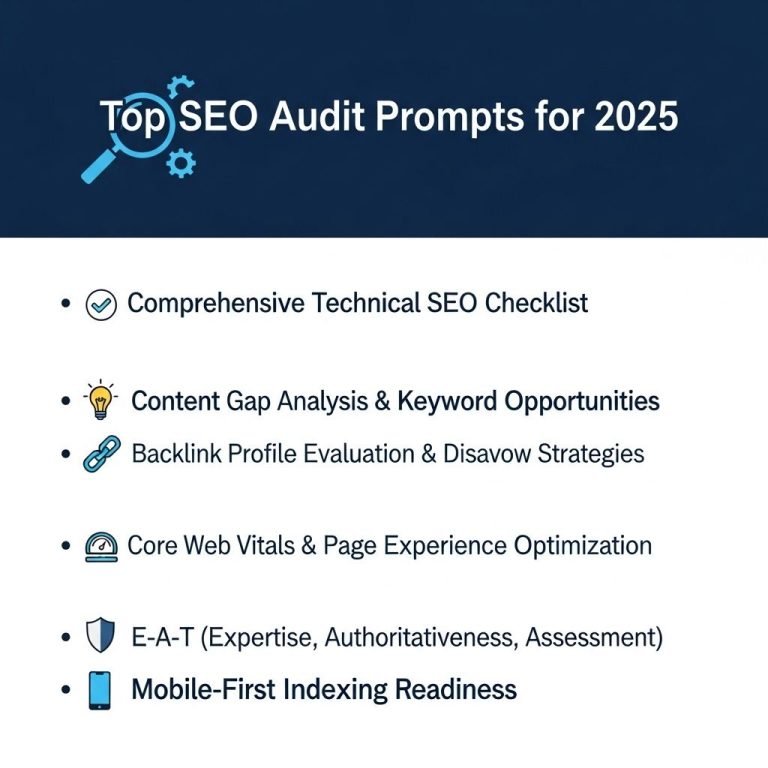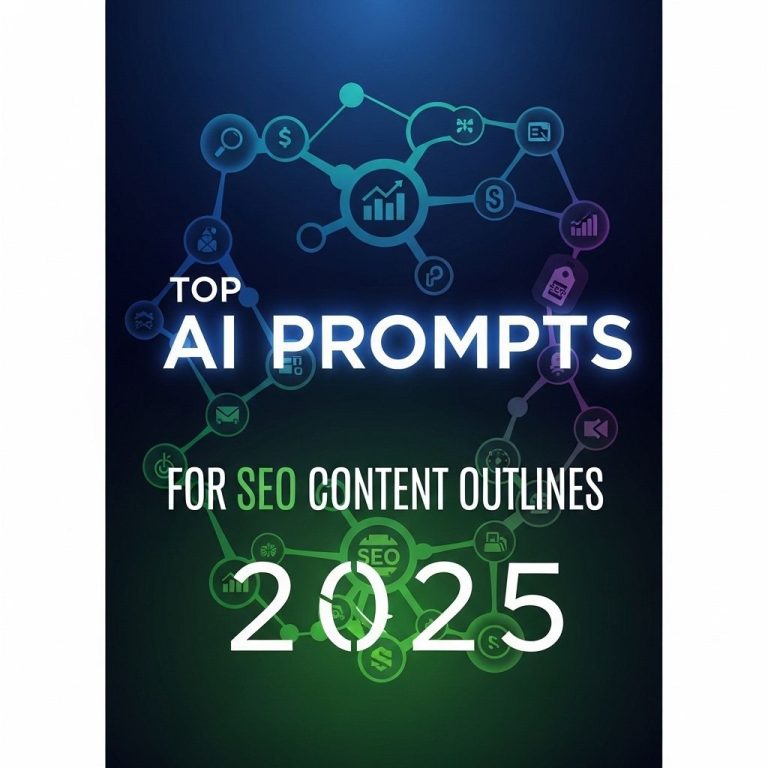As the digital landscape evolves, so too does the importance of search engine optimization (SEO). In 2025, advanced technologies like artificial intelligence (AI) will play a pivotal role in shaping how SEO audits are conducted. By utilizing AI-driven prompts, SEO professionals can streamline their processes, derive insightful analytics, and ultimately enhance their website’s performance in search engine rankings. In this article, we will explore essential AI prompts designed to optimize SEO audits, helping you stay ahead of the curve in an increasingly competitive online environment.
Understanding the Role of AI in SEO
Artificial intelligence has transformed many industries, and SEO is no exception. By analyzing vast amounts of data, AI can uncover trends and patterns that human analysts might overlook. Here’s why AI is vital in SEO:
- Data Analysis: AI algorithms can process large datasets, uncovering insights quickly.
- Predictive Analytics: AI can forecast future trends based on historical data.
- Automation: Routine tasks can be automated, freeing up time for strategy development.
Key Components of an SEO Audit
An effective SEO audit involves several key components:
- Technical SEO: Examining site structure, crawling, indexing, and site speed.
- On-page SEO: Analyzing content quality, keyword optimization, and meta tags.
- Off-page SEO: Assessing backlinks and overall site authority.
- User Experience (UX): Understanding how users interact with your website.
Essential AI Prompts for Technical SEO Audits
Technical SEO is foundational to ensuring your website is accessible and indexable by search engines. Here are AI prompts to enhance your technical SEO audit:
1. Crawling and Indexing
Utilize AI tools to analyze your site’s crawlability and indexing:
- Prompt: “Analyze the XML sitemap for errors and optimization opportunities.”
- Prompt: “Identify any broken links and their impact on crawl efficiency.”
2. Site Speed Optimization
Site speed is a critical ranking factor:
- Prompt: “Evaluate the current page load times across devices and suggest improvements.”
- Prompt: “Identify large images or scripts that may be hindering performance.”
3. Mobile Friendliness
As mobile search grows, optimizing for mobile is imperative:
- Prompt: “Generate a report on mobile usability issues affecting user experience.”
- Prompt: “Analyze responsive design elements and provide areas for enhancement.”
AI Prompts for On-Page SEO Audits
On-page SEO focuses on the content and HTML source code of a webpage. Here are AI prompts to ensure your on-page elements are optimized:
1. Content Quality
High-quality content is essential for higher rankings:
- Prompt: “Assess the readability of the content and suggest improvements.”
- Prompt: “Identify content gaps based on keyword analysis and competitor content.”
2. Keyword Optimization
Keyword research and optimization is crucial:
- Prompt: “Analyze keyword density and provide recommendations for optimization.”
- Prompt: “Generate keyword suggestions based on current ranking positions.”
3. Meta Tags Evaluation
Meta tags are vital for search engines:
- Prompt: “Evaluate the effectiveness of title tags and meta descriptions for each page.”
- Prompt: “Identify missing or duplicate meta tags and suggest unique replacements.”
Off-Page SEO and Link Building Insights
Off-page SEO focuses on external factors that affect ranking, primarily backlinks. Here’s how AI can assist in this area:
1. Backlink Analysis
Understanding your backlink profile is essential:
- Prompt: “Analyze the backlink profile for quality and relevancy of links.”
- Prompt: “Identify toxic backlinks and suggest disavow actions.”
2. Competitor Backlink Strategy
Learning from competitors can enhance your approach:
- Prompt: “Generate a report on competitor backlinks and identify potential link-building opportunities.”
- Prompt: “Identify high-authority domains linking to competitors but not to us.”
Enhancing User Experience with AI
User experience directly impacts SEO. AI can help improve UX through the following prompts:
1. User Behavior Analysis
Understanding user behavior is crucial:
- Prompt: “Analyze user interaction data to identify areas of friction in the user journey.”
- Prompt: “Generate a report on bounce rates and average session durations for key landing pages.”
2. A/B Testing Insights
Testing variations can refine your approach:
- Prompt: “Analyze A/B test results to determine the most effective design or content version.”
- Prompt: “Suggest improvements based on user feedback from A/B tests.”
Future-Proofing Your SEO Strategy
As SEO and AI technology continue to evolve, it’s essential to adapt your strategies accordingly. Consider the following trends:
| Trend | Description |
|---|---|
| Voice Search Optimization | Optimizing content for voice search to accommodate changing user behavior. |
| AI-Driven Personalization | Using AI to create personalized user experiences based on behavior analytics. |
| Video SEO | Focusing on optimizing video content as it becomes increasingly popular. |
In conclusion, leveraging AI prompts for your SEO audits in 2025 will equip you to navigate the complexities of the digital landscape effectively. By integrating these prompts into your SEO strategies, you can enhance your website’s visibility, improve user experience, and stay competitive in an ever-evolving market.
FAQ
What are essential AI prompts for conducting SEO audits in 2025?
Essential AI prompts for SEO audits in 2025 include queries that analyze keyword performance, assess on-page SEO elements, evaluate backlinks quality, and check site speed and mobile responsiveness.
How can AI improve the efficiency of SEO audits?
AI can enhance the efficiency of SEO audits by automating data collection, providing insights through predictive analytics, and offering recommendations based on current SEO trends.
What tools can I use for AI-driven SEO audits?
Popular tools for AI-driven SEO audits include SEMrush, Ahrefs, Moz, and Google Analytics, which leverage AI to analyze website performance and optimize for search engines.
Why is it important to conduct regular SEO audits?
Regular SEO audits are crucial for identifying technical issues, optimizing content, and ensuring compliance with the latest search engine algorithms, ultimately improving website visibility.
What are the key elements of an effective SEO audit?
Key elements of an effective SEO audit include site structure analysis, keyword research evaluation, content quality assessment, backlink profile examination, and technical SEO checks.
How often should I perform an SEO audit for my website?
It is recommended to perform an SEO audit at least twice a year, or quarterly if your website undergoes frequent changes or if you are in a highly competitive niche.




